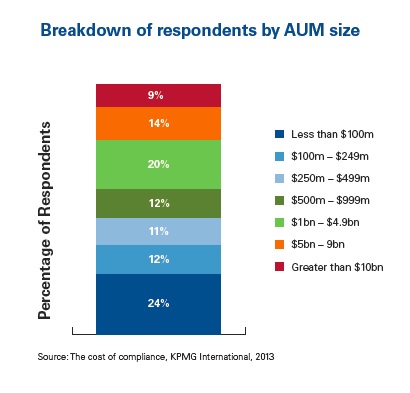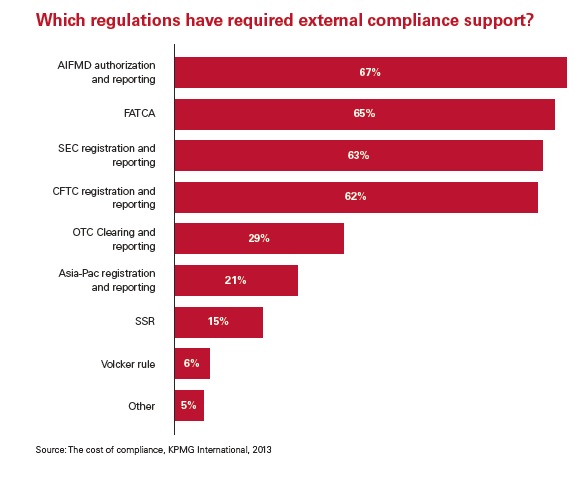Hedge fund managers have sustained significant costs in the course of compliance with new regulatory requirements.
According to a new report by the Alternate Investment Management Association, the Managed Funds Association, and KPMG International, small fund managers have invested on average $700,000 in compliance, medium-sized fund managers $6 million, and large fund managers $14 million.
The industry as a whole has spent $3 billion on compliance costs. This is more than 7% of its total operating costs.
Both relative to assets under management and relative to operating costs, the burden is heavier on the smaller than on the larger firms, and so may constitute a barrier to entry.
Andrew Baker, the CEO of AIMA, said: “The results of this global survey show the industry is serious about building its operational infrastructure for regulatory compliance.” But, he said, barriers to entry are unwise, because they block out the next generation managers who “are an important source of new ideas and talent.”
Interviews and Insights
The report is based on a survey of 200 hedge fund managers from around the world. Geographically, the largest group (39%) is headquartered in North America and a slightly smaller group (32% of respondents) in the U.K. The third largest grouping is Asia-Pacific (16%).
The report is based, also, on “a series of structured one-on-one interviews with leading hedge fund managers, who provided deeper insight into the complexities and opportunities currently facing the sector.”
Managers broadly are of the view that the more complex a regulation, the more expensive it is for those affected. The very complex regulations that most concern them are: the Foreign Account Tax Compliance Act, a law enacted in March 2010 designed to extend the enforcement reach of the U.S. Internal Revenue Service, and the Alternative Investment Fund Managers’ Directive, the EU Directive approved by the European Parliament in June 2011.
FATCA introduces a new reporting regime that, among much else, requires investment funds around the world to report information every year concerning certain U.S. persons or a local tax authority, and to demonstrate their tax withholding capabilities. The report cautions that the necessary documentation “will likely prove to be an expensive chore requiring resources to complete in a timely and wholesome manner.”
Absorbing the Costs
Form PF, part of the SEC registration and reporting regime, as expanded by rule 204(b)-1 in October 2011, doesn’t engender quite as much angst as do FATCA or AIFMD. But it is a close third in terms of the requirement it has generated for external support.
One obvious question is: who is bearing this cost? Are the managers themselves bearing it as a reduction in their take? Or have they passed it on to the funds and their investors?
Managers report that they are absorbing the costs of compliance. The report quotes one European fund manager thus: “We haven’t changed our rate card or our service fees and no additional costs have been passed on to investors.”.
Looking ahead, most managers expect their compliance-focused technology spend to increase between 2013 and 2019. Eighty-nine percent, that is, expect it to increase, 10% expect that it will stay the same, only an optimistic 1% expect that it will decrease.
By a somewhat less lopsided margin most managers also expect that their spending on third party advisors/consultants for compliance/regulatory purposes will increase between now and 2018. On this point, as many as 4% of those questioned are optimists.
EMIR
As the study reminds us, AIFMD isn’t the only regulatory challenge to come from Europe of late. A more recent challenge from that quarter is the European Market Infrastructure Regulation (EMIR).
EMIR came into force on March 15. 2013.
Its requirements will be phased in – the first phase involves risk mitigation for non-cleared OTC counter derivatives. Most transactions will now have to be collateralized, confirmations sent in a timely manner, and contracts marked to market or model on a timely basis. AIMA observes that in its experience, few of the managers affected “have fully appreciate the significant addenda and repapering of agreements that will be required to ensure that such agreements [indirect clearing arrangements] are put into place and that client assets are held in segregated or omnibus accounts….”
Through the course of the phase in, firms will also have to consider their contractual relationships with Trade Repositories.
- English (UK)
- English (India)
- English (Canada)
- English (Australia)
- English (South Africa)
- English (Philippines)
- English (Nigeria)
- Deutsch
- Español (España)
- Español (México)
- Français
- Italiano
- Nederlands
- Português (Portugal)
- Polski
- Português (Brasil)
- Русский
- Türkçe
- العربية
- Ελληνικά
- Svenska
- Suomi
- עברית
- 日本語
- 한국어
- 简体中文
- 繁體中文
- Bahasa Indonesia
- Bahasa Melayu
- ไทย
- Tiếng Việt
- हिंदी
AIMA Survey And Interviews: Regulatory Costs
Published 10/28/2013, 12:47 AM
Updated 07/09/2023, 06:31 AM
AIMA Survey And Interviews: Regulatory Costs
3rd party Ad. Not an offer or recommendation by Investing.com. See disclosure here or
remove ads
.
Latest comments
Install Our App
Risk Disclosure: Trading in financial instruments and/or cryptocurrencies involves high risks including the risk of losing some, or all, of your investment amount, and may not be suitable for all investors. Prices of cryptocurrencies are extremely volatile and may be affected by external factors such as financial, regulatory or political events. Trading on margin increases the financial risks.
Before deciding to trade in financial instrument or cryptocurrencies you should be fully informed of the risks and costs associated with trading the financial markets, carefully consider your investment objectives, level of experience, and risk appetite, and seek professional advice where needed.
Fusion Media would like to remind you that the data contained in this website is not necessarily real-time nor accurate. The data and prices on the website are not necessarily provided by any market or exchange, but may be provided by market makers, and so prices may not be accurate and may differ from the actual price at any given market, meaning prices are indicative and not appropriate for trading purposes. Fusion Media and any provider of the data contained in this website will not accept liability for any loss or damage as a result of your trading, or your reliance on the information contained within this website.
It is prohibited to use, store, reproduce, display, modify, transmit or distribute the data contained in this website without the explicit prior written permission of Fusion Media and/or the data provider. All intellectual property rights are reserved by the providers and/or the exchange providing the data contained in this website.
Fusion Media may be compensated by the advertisers that appear on the website, based on your interaction with the advertisements or advertisers.
Before deciding to trade in financial instrument or cryptocurrencies you should be fully informed of the risks and costs associated with trading the financial markets, carefully consider your investment objectives, level of experience, and risk appetite, and seek professional advice where needed.
Fusion Media would like to remind you that the data contained in this website is not necessarily real-time nor accurate. The data and prices on the website are not necessarily provided by any market or exchange, but may be provided by market makers, and so prices may not be accurate and may differ from the actual price at any given market, meaning prices are indicative and not appropriate for trading purposes. Fusion Media and any provider of the data contained in this website will not accept liability for any loss or damage as a result of your trading, or your reliance on the information contained within this website.
It is prohibited to use, store, reproduce, display, modify, transmit or distribute the data contained in this website without the explicit prior written permission of Fusion Media and/or the data provider. All intellectual property rights are reserved by the providers and/or the exchange providing the data contained in this website.
Fusion Media may be compensated by the advertisers that appear on the website, based on your interaction with the advertisements or advertisers.
© 2007-2024 - Fusion Media Limited. All Rights Reserved.
